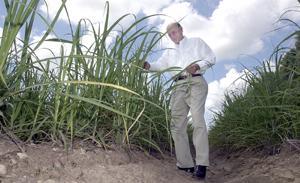
Togo RPCV Jackie Theriot is not happy with CAFTA, the proposed Central American Federal Trade Agreement
Theriot’s national award gives him title of Sugar spokesman
Beverly Corbell
bcorbell@theadvertiser.com
May 25, 2004
Brad Kemp/The Lafayette Daily Advertiser
Caption: Jackie Theriot checks some of his sugar cane Sunday in a field in Catahoula. Theriot recently received one of the sugar industry’s highest honors — the Dyer Memorial Award.
ST. MARTINVILLE — The sugar industry is the only one in agriculture that gets no government subsidies, and Jackie Theriot is not happy about it.
Theriot is also not happy with CAFTA, the proposed Central American Federal Trade Agreement, similar to NAFTA, the much ballyhooed and maligned federal trade legislation that opened trade among north American countries, mainly Mexico. The measure has been criticized for hurting American workers and farmers.
CAFTA will be similar and will open trade with Central American companies, say its proponents. Its opponents, including Theriot, say there are still serious problems with NAFTA, and they’re just as bad, if not worse, in CAFTA.
Theriot, who was just awarded the prestigious Sugar Man of the Year Award in New York City last week, held a conference call with U.S. Sen. Mary Landrieu and Democrat presidential nominee-apparent John Kerry last week about CAFTA, which will soon be considered by Congress after being signed next week by participating countries: the United States, Costa Rica, El Salvador, Guatemala, Honduras and Nicaragua.
Kerry, according to the Associated Press, supported NAFTA but said the Bush administration has not enforced its regulations. If elected, Kerry has promised “….to make American businesses more competitive…”
That’s Theriot’s problem with the Bush administration: its failure to protect his industry, whether it’s lack of subsidies or unfair tariffs and production ratios.
“I’m not opposed to NAFTA overall, but I’m going to fight CAFTA,” he said.
One reason American farmers, particularly sugar producers, are at a disadvantage is because of current trade regulations. Theriot wants the playing field leveled with the 26 countries that produce sugar in the Western Hemisphere.
“Because of the tariff rate quotas, 25 Latin American countries ship 1.3 tons of sugar to the U.S. duty free,” he said. “Our producers could easily produce this sugar. Why do we get hammered over our heads by our U.S. administration and give up production by our sugar farmers for the good of other countries?”
In trade negotiations, another problem is that big business is in control, Theriot said, and smaller producers and consumers are left out.
“Major corporations pull the strings and get whatever they want,” he said. “Consumers are never involved in negotiations, and the negotiators never accept their statements.”
Theriot said he would like to get all 127 world sugar producers at one table so they could come to an agreement that would be more fair to all, including U.S. producers.
“I want to eliminate tariffs and eliminate all subsidies to other countries, and sit down and level the playing field,” he said. “Then we could compete with each other.”
Theriot is no stranger to international negotiations. He’s been working for the sugar industry for many years, not only as general manager of the Louisiana Sugarcane Cooperative in St. Martinville, but as a consultant to some 50 countries over a 20-year period, according the H.W. Dyer & Company, which named Theriot Sugar Man of the Year, and awarded him the Dyer Memorial Award.
Even though he jokes about being “a Cajun in Manhattan with all those tall building” when he received his award, Theriot is no stranger to sophisticated international negotiations. He left Monday for Mexico City, where he’ll meet with representatives of the Mexican sugar industry, as he’s been doing on a regular basis for many years.
Theriot began his international experience in 1962, when he was among the first members of the Peace Corps, which had just been created by President John F. Kennedy. Among Theriot’s prized possessions are two photographs of himself in group shots with Kennedy on the white house lawn and in the Rose Garden.
He said the Peace Corps “shrinks” had a field day with him, trying to figure out why a boy from the Deep South would want to go to Africa. But Theriot said he grew up without prejudice in a home where his father was a fisherman and a grew vegetables and sugar cane.
“In 1945, I was five years old, and one of my early remembrances was cooking sugar cane juice in vats to turn into syrup,” he said. “And I would bring food to the hand-cutters in the field.”
All the hands, black and white, ate at the same table, Theriot said, and he never heard either of his parents express any kind of prejudice.
After spending two years in Africa, Theriot came back to his Catahoula home to start farming, but before he left he got a cable from Sergeant Shriver, the first director of the Peace Corps, that he was still needed.
“Shriver said he wanted me to go back to Africa as a department of state employee, so I went to Niger, in the middle of the Sahara Desert,” he said. “I worked as associate Peace Corps director of operations in Africa.” He stayed there for five more years.
Serving in the Peace Corps, living with native people in grass huts and dirt floors, helped form his character, Theriot said.
“I’ve seen so much that can be done,” he said. “I’ve seen so many people that are suffering.”
©The Lafayette Daily Advertiser
May 25, 2004
